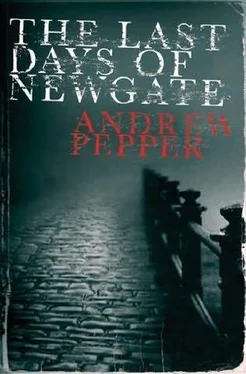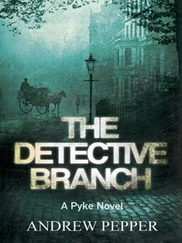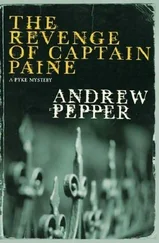Andrew Pepper - The Last Days of Newgate
Здесь есть возможность читать онлайн «Andrew Pepper - The Last Days of Newgate» весь текст электронной книги совершенно бесплатно (целиком полную версию без сокращений). В некоторых случаях можно слушать аудио, скачать через торрент в формате fb2 и присутствует краткое содержание. Жанр: Исторический детектив, на английском языке. Описание произведения, (предисловие) а так же отзывы посетителей доступны на портале библиотеки ЛибКат.
- Название:The Last Days of Newgate
- Автор:
- Жанр:
- Год:неизвестен
- ISBN:нет данных
- Рейтинг книги:4 / 5. Голосов: 1
-
Избранное:Добавить в избранное
- Отзывы:
-
Ваша оценка:
- 80
- 1
- 2
- 3
- 4
- 5
The Last Days of Newgate: краткое содержание, описание и аннотация
Предлагаем к чтению аннотацию, описание, краткое содержание или предисловие (зависит от того, что написал сам автор книги «The Last Days of Newgate»). Если вы не нашли необходимую информацию о книге — напишите в комментариях, мы постараемся отыскать её.
The Last Days of Newgate — читать онлайн бесплатно полную книгу (весь текст) целиком
Ниже представлен текст книги, разбитый по страницам. Система сохранения места последней прочитанной страницы, позволяет с удобством читать онлайн бесплатно книгу «The Last Days of Newgate», без необходимости каждый раз заново искать на чём Вы остановились. Поставьте закладку, и сможете в любой момент перейти на страницу, на которой закончили чтение.
Интервал:
Закладка:
As in most industrial towns eager to show off their new-found wealth, there were a few buildings, such as the White Linen Hall on Donegall Square, which were palatable enough. There was also a smattering of attractively attired people going about their daily business. But on the whole, Pyke quickly concluded, Belfast was a drab town, inhabited by unattractive creatures, made even worse by the fact that it had been built on a bog. Accordingly, sanitation was non-existent, and at high tide the seawater rose up into the town’s sewers and overflowed into the streets, turning them into noxious rivers of waste.
London faced similar problems, of course. But London had other attractions that tempered the bleakness. Here, everything seemed different, more depressing. For one thing, it was a fervently religious town; there were more meeting houses and churches than there were public houses. For another, the guttural accents, as much Scottish as Irish, reminded Pyke that, despite the Act of Union, he was in a foreign country. The green-clad mountains that ringed the town compounded this sense of difference, and while some may have regarded them with approval, Pyke found them oppressive.
From his less than desirable lodgings, it took him only five minutes to walk to the newly constructed mill on York Street. Pyke did not have to ask for directions. All he had to do was look upwards: it was possible to see the giant, six-floor edifice from most parts of the town. From the end of the street, the mill towered above the neighbouring houses, a sheer wall of red brick soaring vertically into the gloomy sky. There was something forbidding, even monstrous, about the building. Its giant chimney stack, its depressingly uniform symmetry and its long, angular windows reminded him of a prison. This impression was augmented both by the number of cripples in the immediate vicinity of the building — mostly women whose hands and feet had been deformed by operating the new machinery — and by his first impressions of the cavernous interior. Pyke wandered through the vast chamber and inspected the hundreds of thousands of whirring wheels, all connected to a giant steam engine, and feeding an army of individual machines. Slumped over each of these was a legion of women and children, some as young as ten, red-faced and blotchy from the stifling humidity. Their dull stares told of the deadening nature of the work.
Eventually Pyke found his way to the main office, where the mill owner, John Arnold, was waiting for him. Pyke had arranged the meeting by correspondence, prior to his departure from Liverpool. In his introductory letter, he had claimed to be the son of a Lancastrian mill owner who was to embark on a fact-finding tour of linen and cotton mills in Ulster and who was particularly interested in those mills that had recently been adapted to the wet-spinning of flax.
Arnold was a younger man than Pyke had been expecting, no more than forty years of age. He cut an ungainly figure, with large jug-like ears and a thick wall of black hair which had been cut into the shape of a pudding bowl. On first impression, he seemed like the kind of man who had once been bullied, but then Pyke noticed his cold, symmetrical face, his wax-like skin and his studied gaze, and understood that this was a man who was comfortable with violence. Pyke took against him immediately and reluctantly consented to a tour of the factory during which Arnold wasted no opportunity to laud his own achievements and business acumen.
Throughout this drawn-out introduction to the intricacies of wet-spinning flax, Pyke had thought about getting straight to the point and asking Arnold whether he knew where Davy Magennis was hiding, but he managed to bite his tongue and limit himself to an apparently innocuous question about the employment of Roman Catholics in the mill.
For a moment, it was as though he had unbuttoned his fly and urinated on the floor. Arnold’s stare suggested incomprehension as well as revulsion.
‘Are you a card player, Mr Hawkes?’ This was the name Pyke had given himself.
Pyke shrugged.
‘Perhaps we could continue this conversation later, in more. . relaxed surroundings.’ Arnold grinned, as though pleased with something he had said. ‘There’s a card game, takes place tomorrow night in a gentleman’s club called the Royal on the south side of Smithfield.’ He was about to dismiss Pyke but instead focused on his unprepossessing attire and started to frown. ‘It’s just a silly wee game, nothing fancy, you’ll understand, but, if I were you, I’d think about wearing an outfit that better suited your rank and station.’
Without another word, he left Pyke to ponder the implications of his parting remark.
Entering his room, Pyke was greeted by the sight of a young woman standing over the bedside table, carefully inspecting his gold fob-watch. More surprising, for Pyke, was the fact that she displayed no embarrassment at being caught. When she finally turned to acknowledge him, still holding the fob-watch, he saw that she was quite attractive: mid-twenties, with a firm, almost plump figure, thick coal-black hair that flowed down her back practically as far as her waist, and the clearest blue eyes he had ever seen. She wore a simple white cotton dress and plain black shoes.
‘Lookit,’ she said, holding up the watch. ‘Make no mistake, mister, you’ve been cheated.’ Her accent was softer than many he had heard, but it still had a vaguely unappealing twang.
‘And you were going to do me the favour of taking the watch away, I suppose?’
‘Why in the Lord’s name would I want a cheap old watch?’ She studied him warily for a moment. ‘Come to think of it, what are ye doing with a cheap old watch?’
‘Maybe I like cheap old watches,’ he said, amused now it was clear she wasn’t a threat.
‘What? Ye just playin’ at bein’ rich?’ She paused for a moment and looked him over. ‘That could be it, because ye don’t look too comfortable in your new clothes. And if ye were rich, ye wouldn’t be stayin’ in a boggin’ room like this.’ She looked around the room, shaking her head.
‘How do you know they’re new?’ He’d purchased shirt and jacket from a gentlemen’s outfitters on Castle Place.
She shrugged, as though the answer was obvious. ‘Why else would ye be scratchin’ yourself under the collar like you got the fleas?’
‘What are you doing here?’
‘Cleaning the room, what does it look like?’ She raised her eyebrows and then nodded, as though coming to some kind of realisation. ‘I was thinkin’ ye travelled awful light for a gentl’man. No clothes to speak of, no servants. Still, ye hide your money well. Friend of mine, works in the new bank in Castle Place, happened to mention a fellow fitting your description changed up twenty pound the other day.’
‘Maybe I should go to the bank right now and have it out with your friend,’ Pyke said, still sizing her up.
‘And what would ye want to go and do a thing like that for? Getting poor hard-working folk into trouble,’ she said, finally putting the watch back on the dresser. ‘Now, back to what I was sayin’. Your money’s not in the room which means you’re carrying it around with ye.’ She smiled, disarmingly. ‘Am I right?’
‘If you were, would I tell you?’
‘Walkin’ the streets with a whole pile of money? Tell me one gentl’man who’d be stupid enough to do that.’ She laughed at her own joke. ‘Then again, tell me one gentl’man who’d willingly stay in a dump like this.’ Then she was offering him her hand. ‘Name’s Megan, nice to make your acquaintance.’
Pyke took it, surprised at the firmness of her shake, and said, ‘Francis Hawkes.’
‘So what brings ye to our fair town, Mr Hawkes? And don’t be tellin’ me you’re here to see the marchin’.’
Читать дальшеИнтервал:
Закладка:
Похожие книги на «The Last Days of Newgate»
Представляем Вашему вниманию похожие книги на «The Last Days of Newgate» списком для выбора. Мы отобрали схожую по названию и смыслу литературу в надежде предоставить читателям больше вариантов отыскать новые, интересные, ещё непрочитанные произведения.
Обсуждение, отзывы о книге «The Last Days of Newgate» и просто собственные мнения читателей. Оставьте ваши комментарии, напишите, что Вы думаете о произведении, его смысле или главных героях. Укажите что конкретно понравилось, а что нет, и почему Вы так считаете.












